How to moisturise your skin correctly: Start with knowing the difference between dry and dehydrated skin
Why does your skin still feel dry, tight or irritated despite using moisturiser diligently?
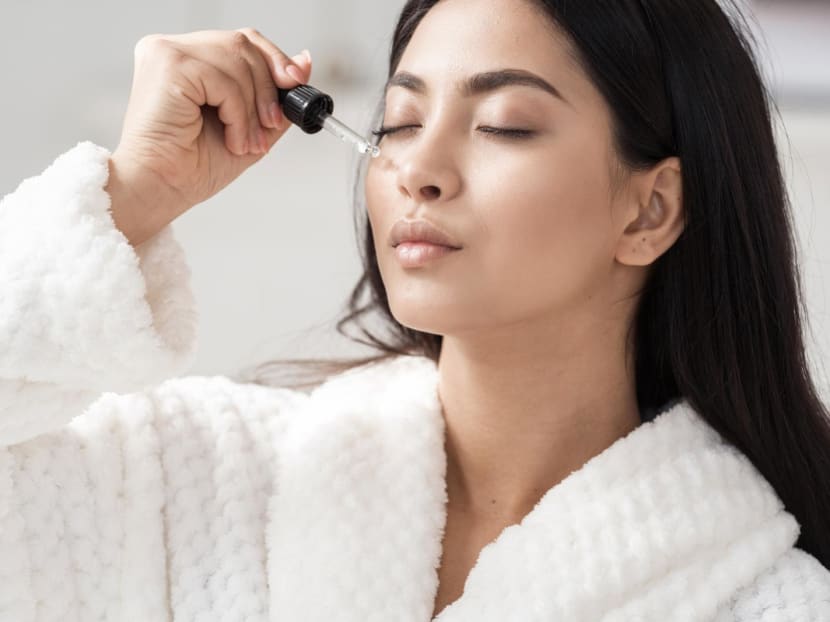
Are you moisturising your skin correctly? (Photo: iStock)
It’s been said that keeping skin well-moisturised is key in ensuring that it stays healthy and looks youthful. But have you wondered why at times, it seems like no matter how much moisturiser you apply, your skin still feels tight or dry? CNA Lifestyle spoke to experts about the reasons why our moisturiser isn’t keeping our skin hydrated.
To understand why keeping your skin well-hydrated is so important for skin health, think of your skin as a brick wall, where the skin cells are the bricks and the lipids and water molecules are the cement that hold the bricks in place, said Dr Liew Hui Min, consultant dermatologist at HM Liew Skin & Laser Clinic.
“The lack of lipids and water will cause the attachment of the cells to be loose, leading in the evaporation of water and also allowing other irritants or allergens to penetrate through into the skin,” Dr Liew explained. The result: Dehydrated skin, obvious fine lines and also inflamed, irritated, itchy, tight or even cracked skin.
DRY SKIN VS DEHYDRATED SKIN
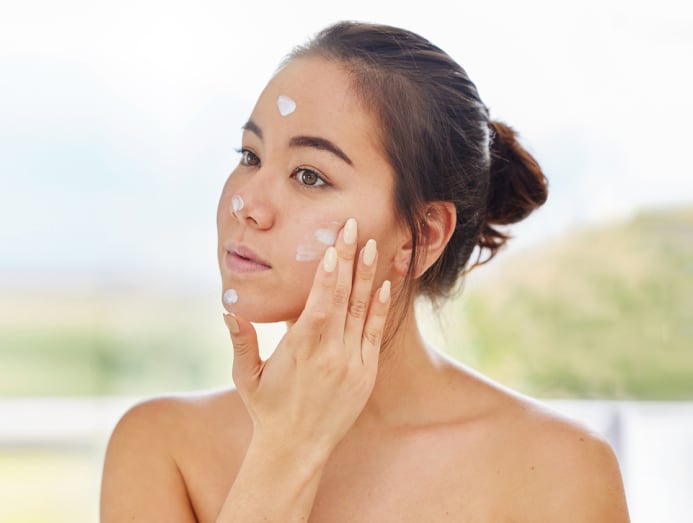
When it comes to keeping skin healthy, it’s just as important to know whether your skin is dry or dehydrated because this will affect how you should care for your skin.
While dry skin and dehydrated skin may sound similar, they should be seen as different conditions. Though sometimes they can also coexist too, shared Dr Yong, an aesthetic doctor at IDS Clinic.
“Both conditions can often feel and look similar – rough texture, tightness especially after cleansing, dull appearance, more prominent fine lines and skin being more prone to sensitivity and irritation.”
According to both doctors, dry skin is defined as skin that is lacking in oil, often caused by a genetic predisposition that causes it to produce insufficient natural oils or lipids. And because of this, dry skin can be a lifelong condition. At the same time, dry skin can also be exacerbated by environmental factors such as dry climates, the use of harsh skincare products, prolonged hot showers and the natural process of ageing.
While dry skin and dehydrated skin may sound similar, they should be seen as different conditions.
Thus, when it comes to treating dry skin, “replenishing the skin’s inherent lipids is essential”, explained Dr Yong. And why the use of a moisturiser is crucial, said Dr Liew. It’s because moisturisers contain emollients or occlusive ingredients that can help restore the lipid barrier and retain moisture, to soothe any skin irritation.
To address this, both of them advised looking for ingredients like ceramide and jojoba oil and glyceryl stearate (a type of fatty acid) that are able to keep the skin barrier intact, lock in moisture and prevent transepidermal water loss as well as irritants from getting into the skin.
Dehydrated skin, on the other hand, refers to a lack of moisture in the top layers of the skin. It’s also why this skin condition is often temporary and caused by external factors such as weather, lifestyle or the use of inappropriate skincare. “When there is a net loss of water from the skin, it becomes dehydrated. As such, it can affect any skin type, including oily and combination skins,” added Dr Yong.
When it comes to dealing with dehydrated skin, Dr Liew shared that daily moisturising is important as it will help restore the skin’s barrier, keeping it healthy. And if you’re not sure what type of moisturisers to look for, Dr Yong advised choosing moisturisers containing humectants, such as hyaluronic acid and glycerin, to attract moisture to the skin.
WHY DOES MY SKIN FEEL TIGHT?
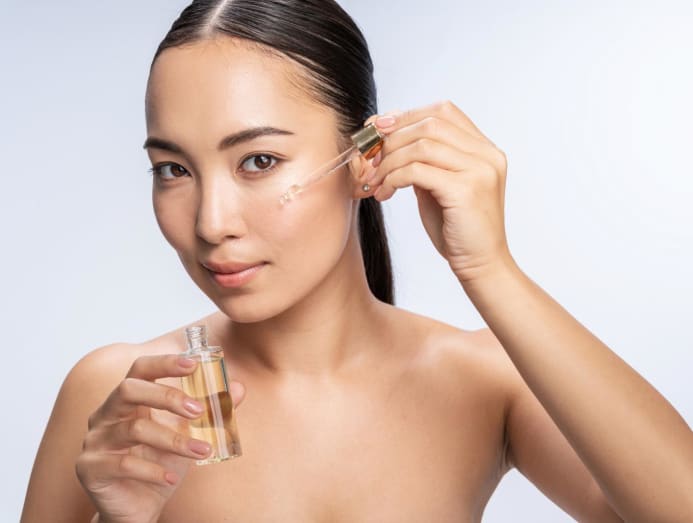
If your skin still feels dry, irritated or rough despite the diligent use of moisturiser, here are some reasons:
1. The use of harsh skincare products
“These can strip the skin of its natural oils and moisture, disrupting its skin barrier, which can contribute to skin feeling dry,” said Dr Yong. This also applies to the overzealous use of skincare products, like exfoliators, astringent toners, acid-infused serums or acne treatments, that can irritate the skin.
2. Environmental factors
Dry air during the colder months or when travelling on wintery vacations can increase the water loss from the skin’s surface. Likewise with indoor heating or air-conditioning that can lower ambient humidity. All these factors can contribute to skin becoming dry and feel tight.
3. Underlying skin conditions or medical issues
Certain skin issues like eczema and psoriasis can result in an abnormal skin barrier function, which in turn limits the ability of the skin to retain moisture. At the same time, hormonal imbalances and consumption of certain medications can also affect the skin’s moisture levels.
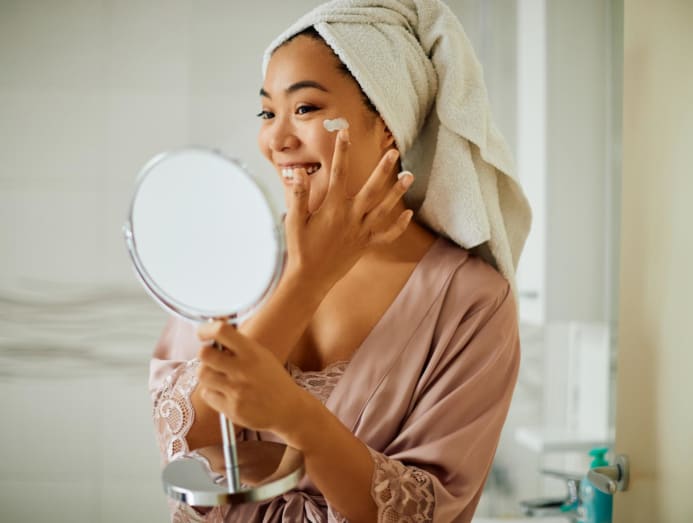
TO SKIP OR NOT TO SKIP THE MOISTURISER
Dr Yong admitted that with the higher atmospheric moisture in Singapore that can contribute to increased skin hydration, some may feel the need to moisturise less. However, she would advise against skipping moisturising completely.
This is because even though it might be humid outside, indoor humidity varies, especially if you work in a cold, air-conditioned environment. “Rather than skipping moisturiser completely, choosing an appropriate moisturiser formulation is a better option,” advised Dr Yong.
Rather than skipping moisturiser completely, choosing an appropriate moisturiser formulation is a better option.
For instance, if you’re not a fan of that sticky, tacky feeling that some moisturisers can leave behind, Dr Liew recommended choosing water-based moisturisers like lotions and gels. While for drier skins, Dr Yong advised opting for a moisturiser with a heavier texture or layering moisturising products.
“Besides providing hydration, moisturisers also help to strengthen the skin’s natural barrier function. It forms a protective barrier against external aggressors, such as air conditioning and airborne particle pollutants,” explained Dr Yong.
TOO MUCH OF A GOOD THING
So if moisture or lipids are what your skin lacks, does it mean that you should load it up with as much as you can?
Apparently not, said both doctors.

“Over-moisturising will cause clogged pores leading to acne and also ‘oil seeds’ known as sebaceous hyperplasia,” said Dr Liew. This is even more so if your skin is oily or acne-prone.
Added Dr Yong: “Excessive moisturisation retains the layer of dead skin cells and may delay skin regeneration whereby newer cells from the deeper layers replace the more superficial dead skin cells. If not adequately exfoliated, the skin can appear dull”.
Over-moisturising will cause clogged pores leading to acne and also ‘oil seeds’ known as sebaceous hyperplasia.
But that’s not all. Dr Yong also shared that applying too much moisturiser can disrupt the natural moisture balance of the skin. “The skin becomes over-reliant on external moisture and this negative feedback mechanism can cause the skin to produce less of its own natural oils.” And this imbalance of skin’s intricate system can lead to skin dryness over time.
Ultimately, a balanced skincare routine is more important. And this means incorporating different skincare products as there is more to keeping skin healthy besides only focusing on imbuing the skin with hydration, said Dr Yong. “It is also important to thoroughly cleanse, regularly exfoliate and protect the skin with sunscreen. Only when the skin is healthy in various aspects, will the beneficial effect of good hydration be most apparent.”
5 MOISTURE-LOVING SKINCARE TO INCLUDE IN YOUR ROUTINE
1. Derma Lab Vitamin E Serum Sunscreen SPF50/PA+++, S$39.90
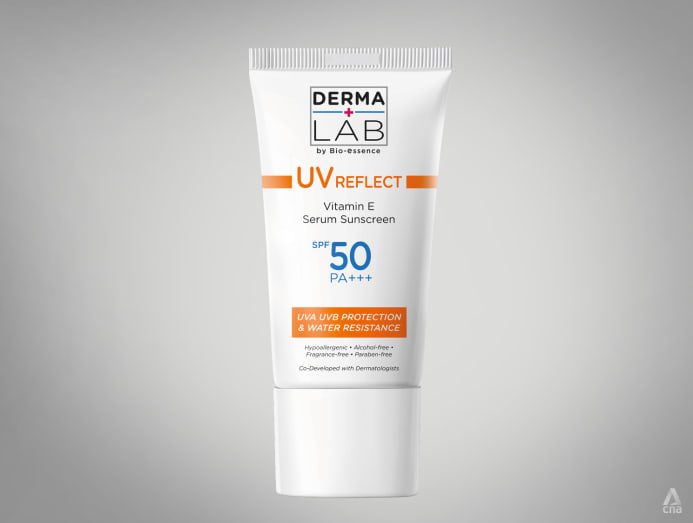
Not only protects against the sun’s damaging UV rays with its high SPF properties, but also keeps skin hydrated and strong with vitamin E, a humectant and emollient.
Available at official Derma Lab store on Shopee.sg, Watsons and Watsons.com.sg
2. M.A.C Cosmetics Hyper Real Skincanvas Balm Moisturizing Cream, S$76
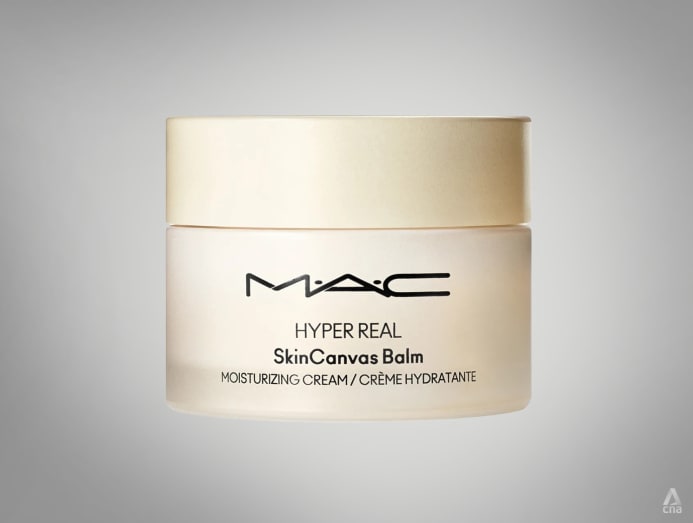
A daily hydrator that soothes and moisturises the skin for up to 24 hours. It also helps strengthen and protect the skin’s barrier with a unique Pro-4 Power Infusion Matrix that contains Japanese peony extract, niacinamide, hyaluronic acid and ceramides.
Available at M.A.C boutiques and counters.
3. Fresh Rose Deep Hydration Balancing Emulsion, S$77
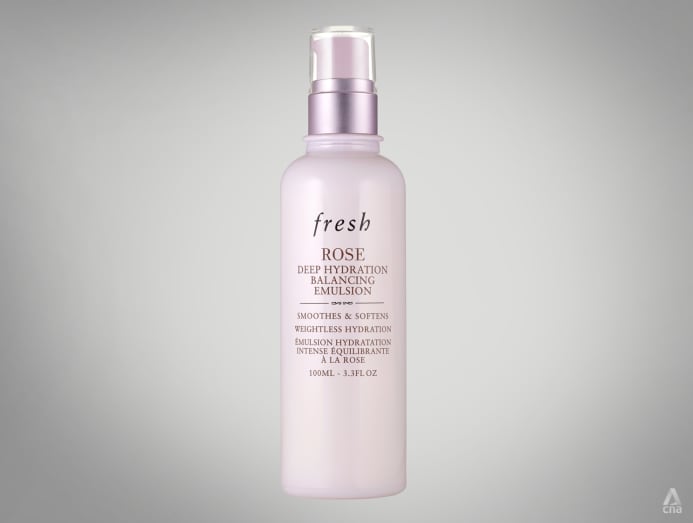
Ideal for oilier skins, this lightweight moisturiser works to address skin’s oil-water balance and keeping it healthy. It’s infused with hyaluronic acid, damask rose and yarrow extract to also help refine skin’s texture for a smoother complexion.
Available at Fresh boutiques.
4. Clarins Hydra-Essentiel [HA2] Night Cream, S$98
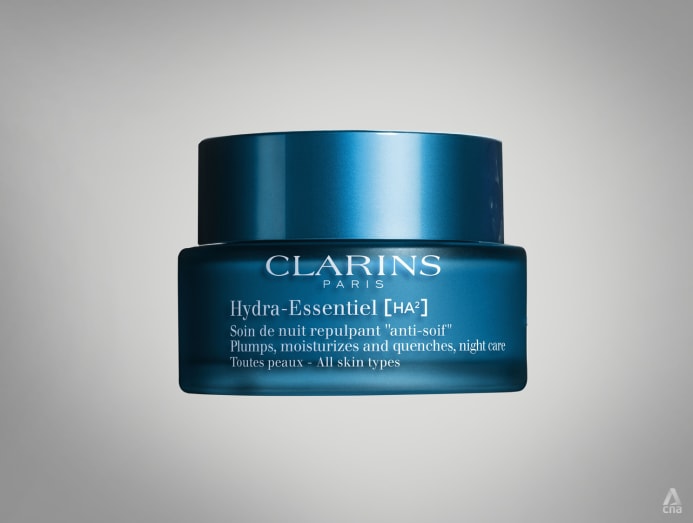
An intensive night-time moisturiser that’s enriched with hyaluronic acid, organic leaf of life extract and a plant-based squalane to hydrate the skin from deep within while locking in moisture from the surface. You’ll wake up looking glow-y and well-rested.
Available at Clarins boutiques and counters.
5. Dr Dennis Gross DermInfusions Fil + Repair Serum, S$123
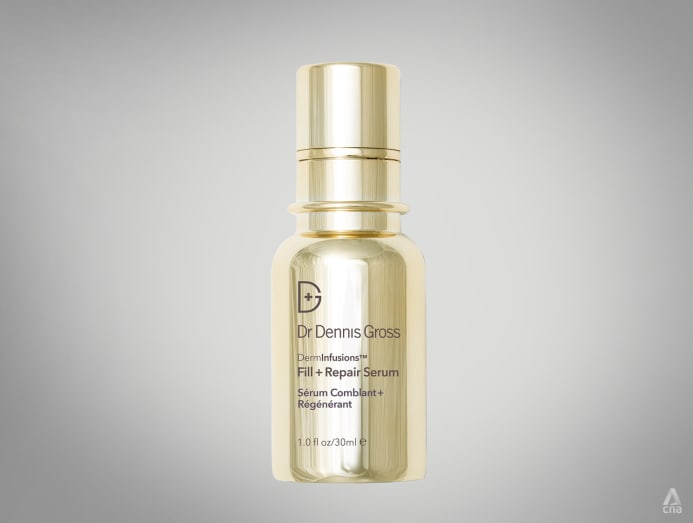
It imbues the skin with moisture thanks to the use of hyaluronic acid in four different molecular weights, four peptide proteins, niacinamide and ectoin. This plumps the skin from within, filling in visible lines for a smoother and more supple complexion.
Available at Sephora stores and Sephora.sg











